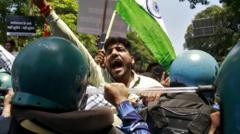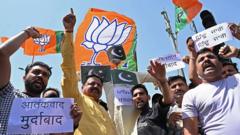In the wake of a shocking terror attack that resulted in the deaths of 26 civilians in Kashmir, Indian Prime Minister Narendra Modi has engaged in conversations with numerous world leaders, signaling India's growing concern over security. However, diplomatic insiders reveal that New Delhi is less focused on garnering international support to de-escalate tensions with Pakistan and more intent on constructing a case for retaliatory military action against its neighbor.
India's Strategic Moves Amidst Tensions with Pakistan

India's Strategic Moves Amidst Tensions with Pakistan
As tensions flare between India and Pakistan following a deadly terrorist attack in Kashmir, India appears to be gearing up for potential military action rather than seeking immediate de-escalation.
Officials from over 100 foreign missions in India have been briefed on the situation by Indian diplomats, who have laid out historical patterns of Pakistan's alleged support for terrorism directed at India. Although no specific group has been named as responsible for the attack, Indian authorities have suggested connections through technical intelligence, such as facial recognition data linking the attackers to Pakistan.
Analysts and diplomats suggest that this could either mean India requires additional time to gather irrefutable evidence before taking action or feels emboldened by the current global climate to proceed without needing justification. The risk of military escalation is acute given that both nations possess nuclear capabilities, and past confrontations have rapidly spiraled out of control.
Despite the potential repercussions, India's recent rise in diplomatic and economic power has led it to adopt a more assertive stance, indicating that it may be ready to respond decisively while facing little immediate international restraint. As the world watches, the situation remains precarious, with the possibility of further conflict looming on the horizon.
Analysts and diplomats suggest that this could either mean India requires additional time to gather irrefutable evidence before taking action or feels emboldened by the current global climate to proceed without needing justification. The risk of military escalation is acute given that both nations possess nuclear capabilities, and past confrontations have rapidly spiraled out of control.
Despite the potential repercussions, India's recent rise in diplomatic and economic power has led it to adopt a more assertive stance, indicating that it may be ready to respond decisively while facing little immediate international restraint. As the world watches, the situation remains precarious, with the possibility of further conflict looming on the horizon.




















